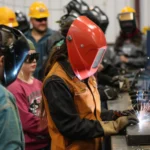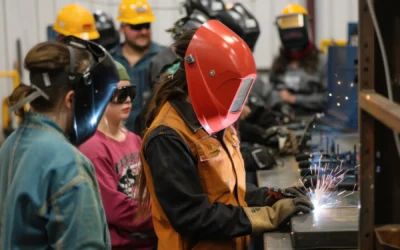Debunking the Myth: Advanced Manufacturing is No Longer a “Dark and Dirty” Industry
When people think of manufacturing, they often envision gritty, grimy factories filled with heavy machinery, harsh working conditions, and outdated processes. This image may have been true decades ago, but today’s advanced manufacturing industry couldn’t be further from it. With technological advances, increased safety protocols, and a focus on environmental sustainability, modern manufacturing is vibrant, clean, and cutting-edge.
Technology Transforms the Industry
One of the most significant shifts in manufacturing is the integration of advanced technology, often referred to as Industry 4.0. Robotics, artificial intelligence (AI), and the Internet of Things (IoT) now play a central role in automating processes, increasing precision, and enhancing safety. This high-tech approach has transformed production lines into streamlined, intelligent systems where workers and machines collaborate in ways that maximize both productivity and safety.
Modern manufacturing floors are increasingly data-driven, where digital dashboards monitor everything from equipment performance to worker safety in real-time. Smart sensors and automation allow plants to predict maintenance needs, reduce waste, and optimize operations — minimizing the need for dirty, labor-intensive tasks.
Clean, Safe, and Ergonomic Work Environments
Contrary to outdated perceptions, modern manufacturing plants prioritize safety and cleanliness. Cleanroom environments, which were once only required for specialized industries, are now becoming more common across sectors. These spaces control air quality, temperature, and humidity, creating comfortable and safe workspaces.
Moreover, employee well-being has become a top priority, with ergonomic workstations, climate-controlled facilities, and regular safety training all becoming standard practice. Advanced safety measures and AI-powered monitoring ensure that employees can focus on high-value tasks in a safe and supportive environment.
Sustainability as a Core Principle
Sustainability has become a hallmark of the modern manufacturing industry. Companies are committed to reducing their carbon footprint, lowering energy consumption, and managing waste responsibly. Clean manufacturing practices, energy-efficient machinery, and renewable energy sources are being incorporated into production processes to reduce environmental impact.
Manufacturers also strive for circular economy practices, meaning they design products and processes to reduce, reuse, and recycle as much as possible. This environmentally conscious approach attracts workers who are increasingly passionate about making a positive impact on the planet.
High-Demand, Skilled Careers with Opportunities for Growth
Manufacturing careers today are some of the most exciting and high-demand opportunities available. With the integration of high-tech systems, the need for skilled technicians, data analysts, and engineers has soared. Manufacturing employees now have opportunities to develop expertise in robotics, computer programming, and data science — fields that offer substantial potential for career growth.
Manufacturing also boasts a culture of lifelong learning, where companies frequently invest in ongoing training and development for their employees. This commitment to skill-building benefits employees, giving them the chance to develop rewarding careers in fields where they are valued for their contributions.
Diversity and Inclusion Are on the Rise
Today’s manufacturing industry is not just diverse in terms of technology but also in terms of its workforce. Many companies actively promote diversity and inclusion, creating environments where people from all backgrounds can thrive. Efforts to bring more women and underrepresented groups into the industry have had a positive impact on company cultures, providing a rich diversity of perspectives that fosters innovation and creativity.
Breaking Down Barriers to New Talent
The next generation of workers is increasingly drawn to advanced manufacturing because it offers dynamic and forward-thinking work environments. By correcting the misconception that manufacturing is dark and dirty, we can attract fresh talent to this thriving industry, showing them that it’s not only a path to a rewarding career but a way to make a real difference in shaping the future.
Advanced manufacturing is clean, smart, and sustainable, providing a vital foundation for modern economies. It’s time to leave behind outdated perceptions and embrace the reality of today’s manufacturing industry — a sector defined by innovation, opportunity, and progress.










